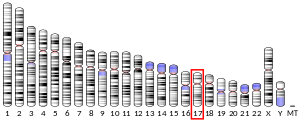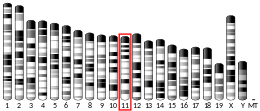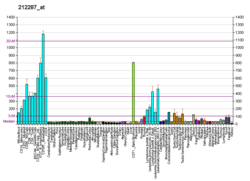SUZ12
Polycomb protein SUZ12 is a protein that in humans is encoded by the SUZ12 gene.[5][6][7][8]
Function
This zinc finger gene has been identified at the breakpoints of a recurrent chromosomal translocation reported in endometrial stromal sarcoma. Recombination of these breakpoints results in the fusion of this gene and JAZF1. The protein encoded by this gene contains a zinc finger domain in the C terminus of the coding region. The specific function of this gene has not yet been determined.[8]
SUZ12, as part of Polycomb Repressive Complex 2 (PRC2), may be involved with chromatin silencing in conjunction with HOTAIR ncRNA, using its zinc-finger domain to bind the RNA molecule.[9]
gollark: But if it's obvious, you can guess it, apiologically.
gollark: Simply do not make any guesses.
gollark: ++choose 1 1 2 3 4 5 6 7
gollark: It's quite obviously #3, according to `random 1 7`.
gollark: Differing concepts of time mostly.
References
- GRCh38: Ensembl release 89: ENSG00000178691 - Ensembl, May 2017
- GRCm38: Ensembl release 89: ENSMUSG00000017548 - Ensembl, May 2017
- "Human PubMed Reference:". National Center for Biotechnology Information, U.S. National Library of Medicine.
- "Mouse PubMed Reference:". National Center for Biotechnology Information, U.S. National Library of Medicine.
- Nagase T, Seki N, Tanaka A, Ishikawa K, Nomura N (August 1995). "Prediction of the coding sequences of unidentified human genes. IV. The coding sequences of 40 new genes (KIAA0121-KIAA0160) deduced by analysis of cDNA clones from human cell line KG-1". DNA Research. 2 (4): 167–74, 199–210. doi:10.1093/dnares/2.4.167. PMID 8590280.
- Koontz JI, Soreng AL, Nucci M, Kuo FC, Pauwels P, van Den Berghe H, Dal Cin P, Fletcher JA, Sklar J (May 2001). "Frequent fusion of the JAZF1 and JJAZ1 genes in endometrial stromal tumors". Proceedings of the National Academy of Sciences of the United States of America. 98 (11): 6348–53. doi:10.1073/pnas.101132598. PMC 33471. PMID 11371647.
- Ross PJ, Ragina NP, Rodriguez RM, Iager AE, Siripattarapravat K, Lopez-Corrales N, Cibelli JB (December 2008). "Polycomb gene expression and histone H3 lysine 27 trimethylation changes during bovine preimplantation development". Reproduction. 136 (6): 777–85. doi:10.1530/REP-08-0045. PMID 18784248.
- "Entrez Gene: SUZ12 suppressor of zeste 12 homolog (Drosophila)".
- Rinn JL, Kertesz M, Wang JK, Squazzo SL, Xu X, Brugmann SA, Goodnough LH, Helms JA, Farnham PJ, Segal E, Chang HY (June 2007). "Functional demarcation of active and silent chromatin domains in human HOX loci by noncoding RNAs". Cell. 129 (7): 1311–23. doi:10.1016/j.cell.2007.05.022. PMC 2084369. PMID 17604720.
Further reading
- Birve A, Sengupta AK, Beuchle D, Larsson J, Kennison JA, Müller J (September 2001). "Su(z)12, a novel Drosophila Polycomb group gene that is conserved in vertebrates and plants". Development. 128 (17): 3371–9. PMID 11546753.
- Weinmann AS, Bartley SM, Zhang T, Zhang MQ, Farnham PJ (October 2001). "Use of chromatin immunoprecipitation to clone novel E2F target promoters". Molecular and Cellular Biology. 21 (20): 6820–32. doi:10.1128/MCB.21.20.6820-6832.2001. PMC 99859. PMID 11564866.
- Cao R, Wang L, Wang H, Xia L, Erdjument-Bromage H, Tempst P, Jones RS, Zhang Y (November 2002). "Role of histone H3 lysine 27 methylation in Polycomb-group silencing". Science. 298 (5595): 1039–43. doi:10.1126/science.1076997. PMID 12351676.
- Kuzmichev A, Nishioka K, Erdjument-Bromage H, Tempst P, Reinberg D (November 2002). "Histone methyltransferase activity associated with a human multiprotein complex containing the Enhancer of Zeste protein". Genes & Development. 16 (22): 2893–905. doi:10.1101/gad.1035902. PMC 187479. PMID 12435631.
- Petek E, Jenne DE, Smolle J, Binder B, Lasinger W, Windpassinger C, Wagner K, Kroisel PM, Kehrer-Sawatzki H (July 2003). "Mitotic recombination mediated by the JJAZF1 (KIAA0160) gene causing somatic mosaicism and a new type of constitutional NF1 microdeletion in two children of a mosaic female with only few manifestations". Journal of Medical Genetics. 40 (7): 520–5. doi:10.1136/jmg.40.7.520. PMC 1735521. PMID 12843325.
- Wang H, An W, Cao R, Xia L, Erdjument-Bromage H, Chatton B, Tempst P, Roeder RG, Zhang Y (August 2003). "mAM facilitates conversion by ESET of dimethyl to trimethyl lysine 9 of histone H3 to cause transcriptional repression". Molecular Cell. 12 (2): 475–87. doi:10.1016/j.molcel.2003.08.007. PMID 14536086.
- Huang HY, Ladanyi M, Soslow RA (February 2004). "Molecular detection of JAZF1-JJAZ1 gene fusion in endometrial stromal neoplasms with classic and variant histology: evidence for genetic heterogeneity". The American Journal of Surgical Pathology. 28 (2): 224–32. doi:10.1097/00000478-200402000-00010. PMID 15043312.
- Cao R, Zhang Y (July 2004). "SUZ12 is required for both the histone methyltransferase activity and the silencing function of the EED-EZH2 complex". Molecular Cell. 15 (1): 57–67. doi:10.1016/j.molcel.2004.06.020. PMID 15225548.
- Kehrer-Sawatzki H, Kluwe L, Sandig C, Kohn M, Wimmer K, Krammer U, Peyrl A, Jenne DE, Hansmann I, Mautner VF (September 2004). "High frequency of mosaicism among patients with neurofibromatosis type 1 (NF1) with microdeletions caused by somatic recombination of the JJAZ1 gene". American Journal of Human Genetics. 75 (3): 410–23. doi:10.1086/423624. PMC 1182020. PMID 15257518.
- Beausoleil SA, Jedrychowski M, Schwartz D, Elias JE, Villén J, Li J, Cohn MA, Cantley LC, Gygi SP (August 2004). "Large-scale characterization of HeLa cell nuclear phosphoproteins". Proceedings of the National Academy of Sciences of the United States of America. 101 (33): 12130–5. doi:10.1073/pnas.0404720101. PMC 514446. PMID 15302935.
- Pasini D, Bracken AP, Jensen MR, Lazzerini Denchi E, Helin K (October 2004). "Suz12 is essential for mouse development and for EZH2 histone methyltransferase activity". The EMBO Journal. 23 (20): 4061–71. doi:10.1038/sj.emboj.7600402. PMC 524339. PMID 15385962.
- Cha TL, Zhou BP, Xia W, Wu Y, Yang CC, Chen CT, Ping B, Otte AP, Hung MC (October 2005). "Akt-mediated phosphorylation of EZH2 suppresses methylation of lysine 27 in histone H3". Science. 310 (5746): 306–10. doi:10.1126/science.1118947. PMID 16224021.
- Lee TI, Jenner RG, Boyer LA, Guenther MG, Levine SS, Kumar RM, Chevalier B, Johnstone SE, Cole MF, Isono K, Koseki H, Fuchikami T, Abe K, Murray HL, Zucker JP, Yuan B, Bell GW, Herbolsheimer E, Hannett NM, Sun K, Odom DT, Otte AP, Volkert TL, Bartel DP, Melton DA, Gifford DK, Jaenisch R, Young RA (April 2006). "Control of developmental regulators by Polycomb in human embryonic stem cells". Cell. 125 (2): 301–13. doi:10.1016/j.cell.2006.02.043. PMC 3773330. PMID 16630818.
- Furuno K, Masatsugu T, Sonoda M, Sasazuki T, Yamamoto K (July 2006). "Association of Polycomb group SUZ12 with WD-repeat protein MEP50 that binds to histone H2A selectively in vitro". Biochemical and Biophysical Research Communications. 345 (3): 1051–8. doi:10.1016/j.bbrc.2006.05.014. PMID 16712789.
- Olsen JV, Blagoev B, Gnad F, Macek B, Kumar C, Mortensen P, Mann M (November 2006). "Global, in vivo, and site-specific phosphorylation dynamics in signaling networks". Cell. 127 (3): 635–48. doi:10.1016/j.cell.2006.09.026. PMID 17081983.
- Nucci MR, Harburger D, Koontz J, Dal Cin P, Sklar J (January 2007). "Molecular analysis of the JAZF1-JJAZ1 gene fusion by RT-PCR and fluorescence in situ hybridization in endometrial stromal neoplasms". The American Journal of Surgical Pathology. 31 (1): 65–70. doi:10.1097/01.pas.0000213327.86992.d1. PMID 17197920.
External links
This article is issued from Wikipedia. The text is licensed under Creative Commons - Attribution - Sharealike. Additional terms may apply for the media files.





